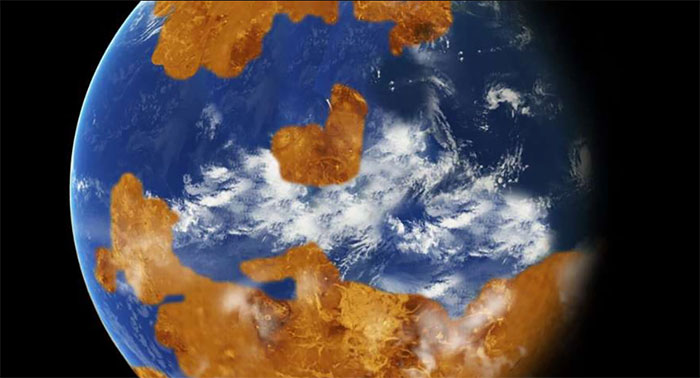Venus can stay?
Venus could be a temperate planet that stored liquid water for 2-3 billion years, until there was a dramatic transformation that began more than 700 million years ago.
A study presented at the Goddard Space Research Institute has given a new insight into Venus's climate history and could be significant for the habitation of exoplanets in similar orbits. self.
To see if Venus could have a stable climate, Dr. Way and his colleague, Anthony Del Genio, created a series of five simulations that assumed different levels of water coverage.

Forty years ago, NASA's Venus mission found hints that Venus could have had water.
In all five scenarios, they found that Venus could maintain a stable temperature for a maximum of about 50 degrees Celsius and a minimum of about 20 degrees Celsius for about three billion years. The mild climate could even be sustained on Venus to this day without a series of events causing the release of carbon dioxide stored in the planet's rocks around 700-750 million years ago. .
"Our hypothesis is that Venus could have a stable climate for billions of years. Maybe the resurfacing event is responsible for the transition from an Earth-like climate to a hot, hell-like home." we see it today, " he said.
Three of the five scenarios studied by Way and Del Genio show the topography of Venus as we see it today and have an average depth of 310 meters deep, an average depth of 10 meters of shallow water and an amount of water Small locked in the ground. For comparison, they also included a scenario with the Earth and ocean topography of 310 meters long and finally a world completely covered by a 158 meter deep ocean.
To simulate environmental conditions at 4.2 billion years ago, 715 million years ago, and today, researchers have adjusted the three-dimensional general circulation model to explain the increase in solar radiation when the Sun our sky heats up throughout its life cycle, as well as changes in atmospheric composition.
Although many researchers believe that Venus is outside the inner boundary of our solar system and too close to the Sun to support the existence of liquid water, new research shows this has could not occur.
"Venus currently has nearly twice the solar radiation we have on Earth. However, in all the scenarios we have modeled, it has been shown that Venus can still support the surface temperature it has. "it exists for liquid water , " said Dr. Way.
At 4.2 billion years ago, soon after formation, Venus completed its rapid cooling phase and its atmosphere will be dominated by carbon dioxide. If the planet evolves the same way as the Earth in the next 3 billion years, carbon dioxide will be sucked down by silicate rocks and locked into the surface. In the second era simulated 715 million years ago, the atmosphere may have been dominated by nitrogen with the same amount of carbon dioxide and methane as today's Earth and these conditions may still be. stable until the present time.
The cause of the explosion that led to the dramatic transformation of Venus is a mystery , perhaps related to the planet's volcanic activity. One possibility is a large amount of bubbling magma, releasing carbon dioxide from molten rock into the atmosphere . Magma freezes before reaching the surface and this creates a barrier that means the gas cannot be reabsorbed. The presence of large amounts of carbon dioxide has caused the greenhouse effect, resulting in an average temperature of 462 degrees of burn found on Venus today.
"Something happened on Venus, where a huge amount of gas is released into the atmosphere and cannot be reabsorbed by the rocks. On Earth, we have some examples of the explosion. large scale , ' Way said.
There are still two major unknowns that need to be addressed before the question of whether Venus could be habitable or not could be fully answered. The first involves how quickly Venus first cooled and whether liquid water could condense on its surface in the first place. The second unknown is whether the global surface resurfacing event is a unique event or simply the latest in a series of events that lasted billions of years in Venus's history.
"We need more missions to study Venus and gain a more detailed understanding of its history and evolution," Way stressed.
- 12 most interesting things about Venus
- Overview of Venus
- Overview of Venus
- NASA wants to bring people to Venus
- Venus Experss are about to plunge into the Venusian atmosphere
- Venus is about to be a
- After 8 years of Venus exploration, Venus Express has run out of fuel
- 10 most interesting things about Venus
- Plan to conquer human Venus
- The ocean may exist on Venus on Earth about 700 million years ago
- Video: Unusual midnight in hell Venus
- Venus has volcanic eruptions
- Century astronomical banquet: Venus passes through the Sun.
- Science explains why Venus has so few volcanoes
 Van Allen's belt and evidence that the Apollo 11 mission to the Moon was myth
Van Allen's belt and evidence that the Apollo 11 mission to the Moon was myth The levels of civilization in the universe (Kardashev scale)
The levels of civilization in the universe (Kardashev scale) Today Mars, the sun and the Earth are aligned
Today Mars, the sun and the Earth are aligned The Amazon owner announced a secret plan to build a space base for thousands of people
The Amazon owner announced a secret plan to build a space base for thousands of people